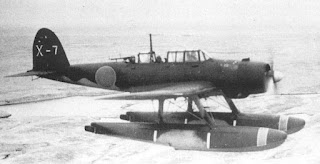It is a delight to host this first part of an article on re-building and improving a Nichimo Aichi E13A 'Jake' floatplane model by Michael Thurow. It is still a matter of some puzzlement that a 60 year old 1/50...
It is a delight to host this first part of an article on re-building and improving a Nichimo Aichi E13A 'Jake' floatplane model by Michael Thurow. It is still a matter of some puzzlement that a 60 year old 1/50 scale kit of such a significant aircraft widely operated throughout the Pacific War has not been superseded by a more recent mainstream or state of the art 1/48 scale kit. And the same goes for the Hasegawa 1/72 scale kit from 1971. There have been kits galore of far more obscure and even projected but never produced Japanese aircraft designs but sadly the IJN workhorse 'Jake' has been ignored, even it seems in vacform or resin media. And even the Nichimo kit may now be gone forever! Over to Michael then:
The Nichimo E13A 'Jake' revisited ? Part 1
Michael Thurow
When I started my floatplane project earlier this year [1] I retrieved an aged Aichi E13A that I built in November 1991 for my 1/48 Japanese series. As more information about kits and models became available with the rise of internet it dawned on me that this was not the 1/48 scale claimed by Nichimo but Marusan's prehistoric 1/50 kit of 1963.
Now I wondered how I was to include this oddity in my new collection. One option would be to keep the model as built out of the box 'in the context of its own art form rather than a scale representation of the original aircraft' (Nick in his May post on the Ginga). But wouldn't it be worthy of a refurbishment? After all, there is no proper 'Jake' in this scale range.
Regrettably I missed the opportunity to take a picture of my original creation before I reached for the chain saw, and therefore can only offer a first view of the model in its dismembered state (with some modifications already in place). You can easily perceive why after a very few hours I wished I had never begun this experiment!
The advantage of working on a once finished model, however, lies in the easy perception of the kit's shortcomings. Step 1 of my project is focused on airframe shape and surface. Let's see what needs to be done.
Apart from many simplifications and inaccuracies there is a major issue with the actual scale (all measurements against a 1/50 scale drawing [2] in Maru Mechanic 12) -
Overall length: OK
Wing span: 5 mm too short
Wing chord: 5 mm too narrow
Tailplane: 10 mm too short and 5 mm too far forward (should be staggered)
Floats: 5 mm too long, a bit too wide and spaced 3 mm too wide (accurate for 1/48!)
Flaps: Wrong planform at the wing root and a broad gap at the bottom
Ailerons: too long into the wing tips
In retrospect, increasing the wing chord will remain the only flaw I feel unable to address. To avoid an untypical lathy wing aspect I'm planning to conceal it by folding the wings.
The bottom centre section demanded a number of detail improvements. Marusan's proposition was a little too artistic [3]. Note the tedious amount of inspection holes on the E13A.
At this stage I began debating with myself whether to try and move the horizontal tail back to its proper position. That would add at least another couple of days to an already complex project. Finally my loco ambition took over - what can be changed should be changed!
To round off this episode I scribed some more panel lines and refreshed the riveting. To be continued . .
Annotations
[1] My first finished model, a Vought Kingfisher, can be viewed here.
[2] Maru Mechanic's dimensions and proportions were verified as accurate by taking ratios from two straight E13A profile photos as follows: Fuselage (from engine gills to vertical stabiliser) vs canopy length = 1.9; vs float length (less rudder) = 0.9; vs. overall height at rudder hinge = 3.5.
[3] An internal layout profile in Maru Mechanic (p.19) shows the bombsight stored on the port side of the observer's cockpit (photo evidence on p.29) and the recce camera on the starboard side. The larger floor window should then be to starboard as in the Model Art No.565 scale drawing.
With special thanks to Michael for sharing this interesting and useful article. A tour of the various Marusan and Nichimo Jake kit releases may be found
here.
Image credit: Heading photo via Wiki; Box art © 1970 Nichimo & © 1963 Marusan via Michael Thurow; All other photos © 2023 Michael Thurow
View Entire Post






















